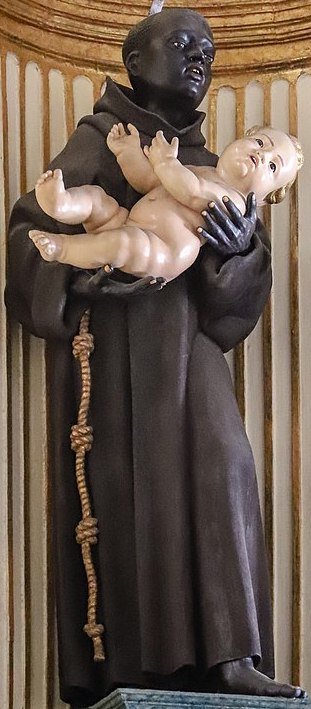Feast Day: April 5

There is a soup kitchen in Syracuse housed in an old Catholic church. It’s one of those beautiful old buildings that has no congregation now to sustain it and had to be repurposed. The altar has become a kitchen and those in need receive food at a serving line where once parishioners received the Bread of Life. It’s sad to see a parish go under but, as my wife remarked, it is fitting that the altar space is still used to offer a sacrifice of love for our neighbors and that people are still nourished there in Jesus’ name.
There is something holy about feeding others out of love: a person making soup for a sick loved one or friend; the parent in the kitchen pulling together dinner after a full day’s work; the intimacy of a child suckling at a mother’s breast; Jesus feeding us from his own body. Nourishing others with love serves them both materially and spiritually. It is almost a perfect service and therefore, in the topsy-turvy Christian worldview, perfect leadership. “Whoever wishes to be great among you shall be your servant; whoever wishes to be first among you shall be your slave. Just so, the Son of Man did not come to be served but to serve and to give his life as a ransom for many” (Mt 20:26-28).
The most famous story of St. Benedict the Moor, our saint for this week, is of literal angels in the kitchen. It is a story of holiness in humble service that became holiness in servant leadership. St. Benedict’s life is also the story of a Black Catholic, one whose recognition helped Venerable Augustus Tolton (the United States’ first black priest) know that he had a home in the Church.
From a Child of Slaves to a Franciscan Guardian
The word “Moor” originally referred to people from what is now Morocco and Algeria. It evolved during the Middle Ages into a generic term for people with darker skin than Europeans. Benedict’s parents came to Sicily around 1500 A.D. as slaves bought from North Africa (quite likely brought across the Sahara from West Africa by Arabs). Christopher, Benedict’s father, was an extraordinarily talented and pious man who was put in charge of his Sicilian owner’s estate. He was demoted for giving too much away in alms and then reappointed when the estate went into decline without him. Christopher, in addition to persuading his master to practice charity, used his influence to gain a promise of freedom for any children he might have. So his son Benedict was born a free man.
The young Benedict worked as a humble shepherd until a chance meeting with a noble knight who had given up his wealth to found a small community of hermits inspired by St. Francis. The former knight, impressed with the young man’s supernatural serenity, convinced him to join. During a tumultuous period of reorganization for Franciscans, the hermits moved several times before joining a consolidated community of friars near Palermo, Sicily.

At each place the hermits lived, Benedict became famous locally for his sanctity. He lived a life of prayer and self-discipline, such as sleeping on the ground or on a bare board. He ate little food and always without condiments or seasoning, which is ironic since he loved cooking for his brothers. Beyond that, there was just something about his patience, humility, and genuine desire to serve others that attracted people. Some came to him for spiritual advice and some for prayers for healing. His miraculous healings ranged from curing a poor country woman with breast cancer to raising the Count of Gagliardi from what was expected to be his deathbed. He also brought people to confession.
In time, his Franciscan brothers made him their house’s leader (called a “guardian” by the Franciscans to remind their leaders that they are appointed only to take care of their brothers). Benedict protested that he couldn’t even read or write and was not a priest. His brothers insisted. Benedict served his term with distinction before retiring once again to the kitchen.
Kitchen Angels, Service, and Leadership

Benedict’s brothers only actually saw angels helping him once. The occasion was the visit of a prominent churchman eager to meet the budding saint. Benedict insisted on cooking the meal as always but, as dinner time approached, his brothers were shocked to find the kitchen empty. They frantically searched all over before finding Benedict hidden away in prayer. Benedict calmly told them to go away and that everything was under control. Sure enough, when he emerged just before dinnertime, two strangers dressed in shining white robes brought out a fine meal from the kitchen for their guests.
Benedict performed a number of miracles providing food both for the poor begging alms at the door and for his brothers. Almost all his miracles happened while he prayed. Benedict’s spiritual warfare against temptation and against the demons of doubt prepared the ground for him to trust that God would provide. That’s what allowed him to serve with confidence. When I spent a post-college year volunteering with the Franciscans at a food pantry, I’d feel panic as our stocks of food dwindled. Then, suddenly, someone would show up with bags of food to donate. After the third time, I began to think that maybe God was telling me something about trust, something that Benedict had mastered early. Benedict teaches us that prayer comes first even when (or especially when) we’re tempted to run around trying to solve problems on our own.
That’s part of what made Benedict a great leader. Prayer first, then service, then himself last. He still made the hard decisions that came with being a leader, but people accepted them because they trusted he knew God and was doing it out of goodness. The humility that made him seek to serve behind closed doors in the kitchen also made him accessible as a leader. When he discovered that he had disciplined a novice in error, Benedict had no hesitation in publicly admitting it and kneeling at the novice’s feet to ask forgiveness.
His humility was contagious. His biographer specifically names half a dozen masters of theology (including an expert from the Council of Trent) who came to seek Benedict’s advice on doctrine in recognition of this illiterate Black man’s piercing theological insight. Many academics have trouble seeking advice from peers, much less an uneducated outsider. I think Benedict’s obvious humility made him easier to approach and also inspired these intellectual leaders to practice humility like him.
Jesus came to serve and all of us are called to serve others. Some of us may be called to lead as well. Do I have that humility? Am I willing to let others lead and to be a simple servant? To not be concerned about advancement to something that seems more prestigious? And if I am called to lead, do I see myself as above those I lead or do I look for the opportunity to lift them up? May the example of St. Benedict remind us that true Christian leadership requires humble service and also requires prayer. As we enter Palm Sunday, may we remember that our King, entering Jerusalem on a humble donkey, came to us willing to give everything up and give everything to us out of love.
A Note on Race and St. Benedict
One of the striking things about the Life of St. Benedict the Moor to a modern American is how little role race enters into it. Even the term “Moor” is not exactly a racial term. A frustrated brother dealing with the crowds coming to see the saint refers to him as “the dog of a slave,” but that is pretty much it. It is quite possible that this is the result of a white man writing his life and Benedict would have written something quite different. It, however, is also possible that race really was not as important in sixteenth-century Sicily.
Prejudice against foreigners and those who look different have always been part of human history, but race as an all-pervading biological category is a modern invention. Two movements created modern racism. First, the horrors of the transatlantic slave trade and the Caribbean plantations demanded some justification—for how could you treat full-fledged human beings in that way? The second movement, the scientific revolution, generated the theory of biological racial difference which gave that justification. The scientific revolution was a good thing on the whole and scientists in the past century have gradually disowned that earlier work, but we are still dealing with the fallout of centuries of pervasive scientific racism. However, both the slave trade and the scientific revolution were in their infancy in the 1500s, which means that Benedict the Moor lived before modern racial categorization. Perhaps going back to Benedict’s life can remind us that the sin of racism is not an immutable fact of society? Perhaps he can help us envision a world in which racism does not exist?

If you have a response, thoughts, or questions, please comment at the bottom of the page. Consider subscribing below to get weekly email notifications about new reflections and other news.


